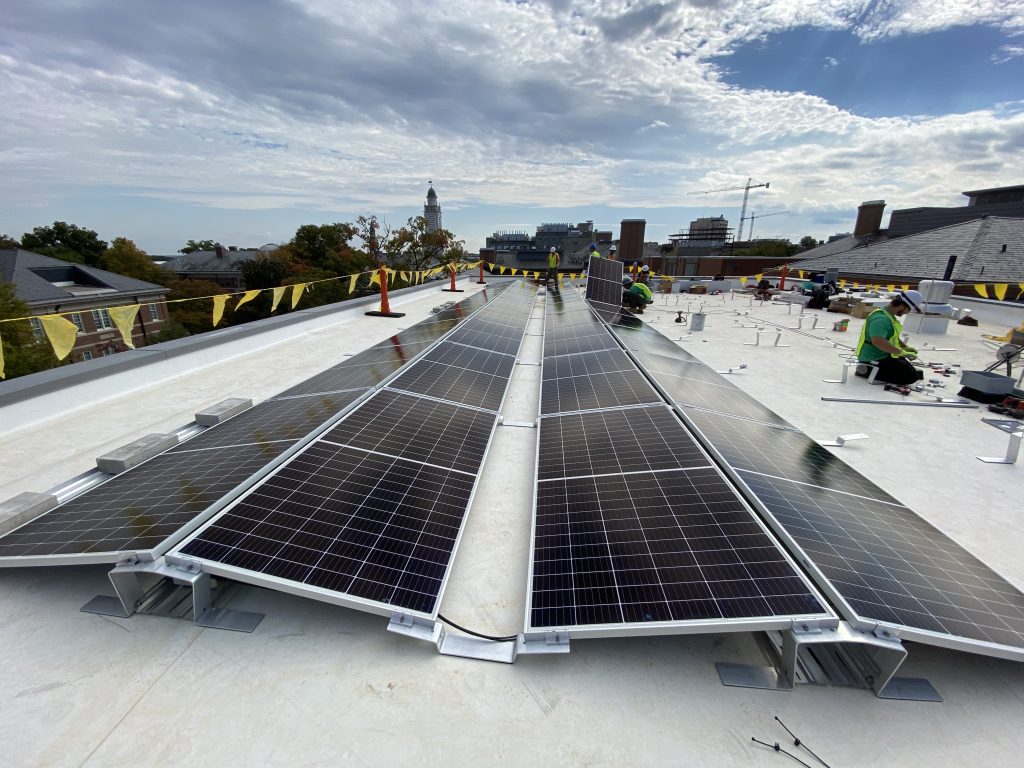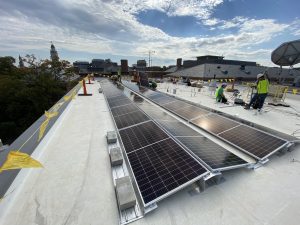Climate Action
Transparent Data Reporting and Strong Community Partnership
UNC-Chapel Hill began tracking its greenhouse gas emissions in 2007. Sustainable Carolina analyzes greenhouse gas emissions, reporting the data annually.
This transparent reporting allows Carolina to establish connections on campus and within the wider community. In 2021, we released our Climate Action Plan jointly with the Town of Chapel Hill. In 2022, we participated in our first energy transition town hall with UNC Student Government.

Climate Dashboard
Since 2007, the University’s overall emissions have decreased by 36%. Innovative renewable solutions, smart operational practices, individual energy saving actions and high performance buildings contributed to this success.
UNC-Chapel Hill aims to be carbon neutral by 2040.
Key elements for decreasing campus emissions include:
- Improving energy efficiency.
- Reducing coal use at the University’s cogeneration facility.
- Increasing renewable energy.
- Working toward a renewable energy purchasing strategy.
Climate Action Plan
UNC-Chapel Hill’s Climate Action Plan (CAP) outlines 23 new strategies for achieving two goals:
- Comply with two North Carolina Executive Orders:
- Executive Order 80: 40% statewide reduction of greenhouse gas emissions by 2025
- Executive Order 246: 50% statewide reduction by 2030
- Achieve net-zero greenhouse gas emissions by 2040.
The plan is a living document and is updated as progress is made.
Climate Action Plan
Climate Action History
In 2007, UNC-Chapel Hill signed the the American College and University Presidents’ Climate Commitment. Two years later, the University published its first Climate Action Plan, outlining 15 strategies for carbon neutrality by 2050. Carolina has since implemented 75% of the near-term strategies outlined in the first CAP.
In 2019, both the Intergovernmental Panel on Climate Change and the U.S. Federal Government issued reports emphasizing the need for immediate climate action and the potential consequences of not taking action. The responsibility of being a leader in climate action has never been greater for Carolina than it is now. The 2021 CAP, updated in 2022, represents the first step of our renewed commitment to sustainability.
Climate Action Stories
Campus Partners
Town of Chapel Hill: Chapel Hill released its Climate Action Plan in 2021. Since that time, the sustainability team has grown from a team of one to a team of three.
UNC Transportation and Parking: Promotes the Commuter Alternative Program, incentivizing students, faculty and staff to take the bus, bike, walk or carpool to work.
Study Abroad, Travel Services and Fleet Services: Provide data and information to develop the transportation portion of Carolina’s Climate Action Plan.
UNC Energy Management: Monitors, controls and reduces energy use in campus buildings. The group educates campus on energy conservation strategies and provides our team with data for our Climate Action Plan.
UNC Energy Services: Manages chilled water, steam, electric distribution and water systems on campus. They also provide us with data for use in our Climate Action Plan.






